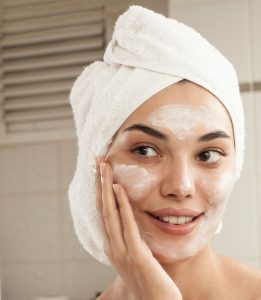Can I Scrub Peeling Skin?
Peeling skin can indeed be a bothersome issue, often arising from common causes such as sunburn, dryness, or certain skin conditions. While the initial impulse might be to scrub away the peeling skin, it’s crucial to understand the implications and explore alternative approaches for managing this condition effectively. In this comprehensive guide, we will delve deeper into the topic of peeling skin, covering its causes, implications, treatment options, preventive measures, and more.
Understanding Peeling Skin
Introduction to Peeling Skin
Peeling skin is a phenomenon characterized by the shedding of the outermost layer of the skin. This process, known as desquamation, can occur naturally as part of the skin’s renewal cycle or as a response to various external factors and internal conditions. Also, read about Why Is My Skin Peeling on My Face After Skincare
Common Causes of Peeling Skin
Peeling skin can stem from a multitude of factors, including:
- Sunburn: Overexposure to ultraviolet (UV) radiation from the sun can damage the skin cells, leading to inflammation and subsequent peeling.
- Dryness: Insufficient moisture in the skin can cause it to become dry, cracked, and prone to peeling.
- Skin Conditions: Certain dermatological conditions such as eczema, psoriasis, and fungal infections may result in peeling skin as a symptom.
- Allergic Reactions: Allergens in skincare products, cosmetics, or environmental factors can trigger allergic reactions, leading to skin irritation and peeling.
- Chemical Exposures: Harsh chemicals present in cleaning agents, detergents, or industrial substances can strip the skin of its natural oils, causing it to peel.
The Healing Process
When the skin begins to peel, it signifies the body’s attempt to shed damaged or dead skin cells and initiate the healing process. This natural mechanism helps to eliminate debris, pathogens, and toxins from the skin surface, allowing for the regeneration of healthier skin cells underneath.
Is It Safe to Scrub Peeling Skin?
Risks of Scrubbing Peeling Skin
While the instinctive response to peeling skin may be to scrub or exfoliate it away, this approach can potentially do more harm than good. Vigorous scrubbing can exacerbate skin irritation, inflammation, and redness, further compromising the skin’s integrity. Moreover, excessive exfoliation can disrupt the skin’s natural barrier function, rendering it more susceptible to infections, allergens, and environmental aggressors.

Alternative Approaches
Instead of resorting to abrasive scrubbing techniques, consider adopting gentler methods to address peeling skin:
- Hydration: Proper hydration is essential for maintaining skin health and preventing dryness. Drink an adequate amount of water daily and use hydrating skincare products to replenish moisture levels in the skin.
- Moisturization: Apply a rich, emollient moisturizer to the affected areas to soothe dryness and promote healing. Look for products containing ingredients such as hyaluronic acid, glycerin, or shea butter, which help to lock in moisture and restore the skin’s natural barrier.
- Cool Compresses: Applying cool compresses or wet dressings to the peeling skin can help alleviate discomfort, reduce inflammation, and promote healing. Simply soak a clean cloth in cold water and gently apply it to the affected area for a few minutes at a time.
- Occlusive Dressings: Occlusive dressings, such as petroleum jelly or medical-grade silicone sheets, can create a barrier over the peeling skin, preventing moisture loss and facilitating the healing process. Apply a thin layer of occlusive ointment to the affected area and cover it with a clean bandage or gauze.
- Topical Treatments: Over-the-counter (OTC) topical treatments containing ingredients like hydrocortisone, calamine, or colloidal oatmeal can help alleviate itching, redness, and irritation associated with peeling skin. Follow the manufacturer’s instructions and consult a healthcare professional if symptoms persist or worsen.
Preventive Measures
Taking proactive steps to prevent peeling skin can help maintain the skin’s health and integrity:
- Sun Protection: Shield the skin from harmful UV radiation by wearing protective clothing, seeking shade, and applying broad-spectrum sunscreen with a high SPF.
- Hydrating Skincare Routine: Establish a regular skincare regimen comprising gentle cleansers, moisturizers, and serums tailored to your skin type and concerns.
- Avoiding Harsh Chemicals: Minimize exposure to harsh chemicals found in skincare products, household cleaners, and personal care items that can strip the skin of its natural oils and disrupt its barrier function.
- Humidification: Use a humidifier to add moisture to the indoor air, especially during the dry winter months or in arid climates.
- Healthy Lifestyle Habits: Maintain a balanced diet rich in vitamins, minerals, and antioxidants, exercise regularly, manage stress levels, and prioritize adequate sleep to support overall skin health.
For more information visit our website urbansoutfitter.com
Conclusion
In conclusion, while the temptation to scrub away peeling skin may be strong, it’s essential to approach this issue with caution and adopt gentle, skin-friendly strategies for managing it effectively. By understanding the underlying causes, avoiding abrasive practices, and embracing hydrating and soothing measures, you can promote healing, alleviate discomfort, and prevent future episodes of peeling skin.
FAQs
Can I use a scrub on peeling skin?
It’s best to avoid using abrasive scrubs on peeling skin, as they can further irritate the skin and compromise its barrier function.
How long does peeling skin take to heal?
The healing time for peeling skin varies depending on the underlying cause, severity, and individual factors. In general, it may take several days to weeks for the skin to fully regenerate and restore its integrity.
Is it normal for skin to peel after sunburn?
Yes, peeling skin is a common response to sunburn as the body sheds damaged skin cells to facilitate healing and repair.
Should I moisturize peeling skin?
Yes, moisturizing peeling skin is essential to replenish lost moisture, soothe irritation, and support the skin’s natural healing process. Opt for gentle, hydrating moisturizers free of fragrances or harsh additives.
When should I seek medical attention for peeling skin?
If peeling skin is accompanied by severe pain, excessive redness, swelling, blistering, or signs of infection such as pus or fever, it’s crucial to seek prompt medical evaluation and treatment from a healthcare professional.
